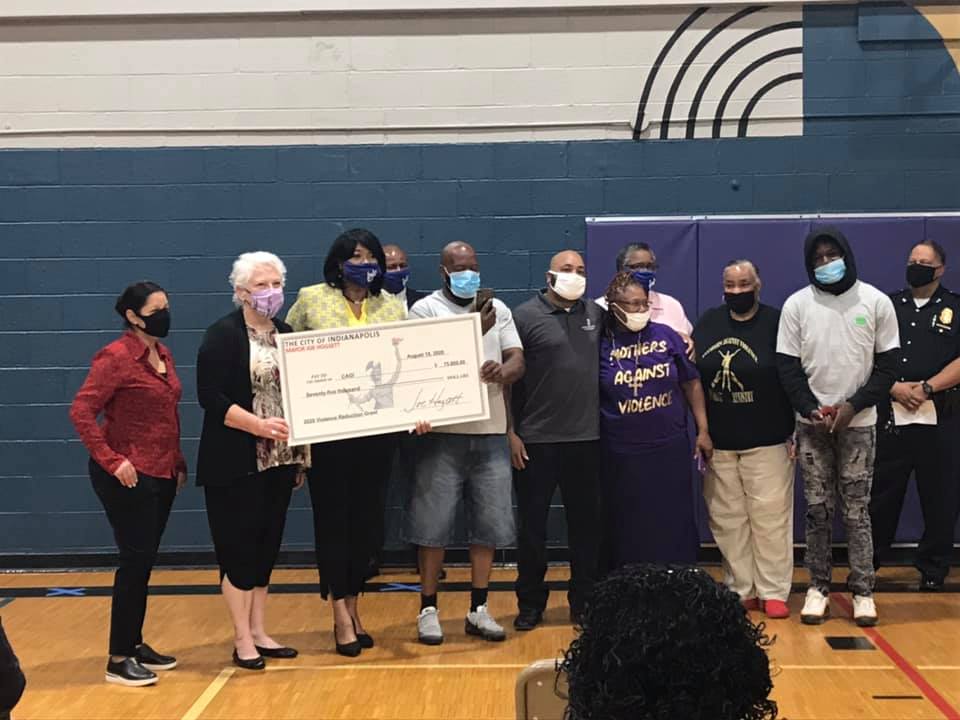
On August 18, 2020 the Indianapolis Office of Public Health & Safety announced that CAGI was one of four organizations receiving $75,000 grants to reduce violence and promote healing in our communities.
CAGI in collaboration with our partners will use the resources to intercept individuals in need, continue to provide current programming the community relies on while offering a new coherent, interconnected, holistic solution to the systemic plague of violence. Those new programs include emotional regulation training, employment placement, cognitive-based therapy, and case management.
For more information on our programs to reduce violence contact Val Tate (vtate@cagi-in.org).
OFFICIAL ANNOUNCEMENT FROM CITY OF INDIANAPOLIS
www.indy.gov/activity/violence-reduction
Mayor Joe Hogsett tasked the Office of Public Health & Safety to directly intervene in violence in Indianapolis neighborhoods, build the capacity of grassroots organizations engaged in violence prevention, and ensure resources reach the residents who need them most.
This effort is led by the City’s Director of Community Violence Reduction and supported by the Indy Peacemakers – activists from local neighborhoods who act as violence interrupters and provide operational assistance to grassroots neighborhood groups engaged in violence prevention.
The Office of Public Health and Safety administers the Community-Based Violence Prevention Partnership, a grant program that invests $300,000 a year in evidence-based violence prevention services offered by grassroots organizations in Indianapolis neighborhoods. In combination with the Community Crime Prevention Grant Program, which has seen a $750,000 increase in funding over the last three years, this represents the largest investment in neighborhood-based anti-crime efforts in more than a decade.
In August, Mayor Joe Hogsett and Director of Community Violence Reduction Shonna Majors announced the following recipients of the 2020 Community-Based Violence Prevention Partnership grants.
RecycleForce and B4UFALL
RecycleForce provides transitional employment and other services to Indianapolis justice-involved adults, with a focus on 14 ZIP codes that experience violence. Its evidence-based program focuses on building occupational skills, providing safety training, job search and placement assistance. RecycleForce’s grant award will help expand its program for direct peer outreach mentoring services to RecycleForce transitional employees, provided in large part through a contract with the mentoring organization B4UFALL. B4UFALL will also engage in on-street violence intervention and interruption.
Community Action of Greater Indianapolis, Inc. (CAGI)
Community Action of Greater Indianapolis, Inc. (CAGI) is a nonprofit organization dedicated to the reduction and ultimate elimination of poverty among the clients in its service area. CAGI and its partners aim to intercept individuals in need, continue to provide current programming the community relies on while offering a new coherent, interconnected, holistic solution to the systemic plague of violence. Those new programs include emotional regulation training, employment placement, cognitive-based therapy, and case management.
Edna Martin Christian Center
Edna Martin Christian Center is focused on providing violence prevention case management, restorative justice training, and mental health services to 40 youths between the ages of 18 to 24. The youth will be referred from the Youthful Offender Unit of the Marion County Superior Court Adult Probation. Services provided include job readiness, occupational skills training, financial literacy, income support, entrepreneurship, and more.
VOICES
VOICES is a healing-centered, community arts organization that provides after-school and in-class programming. VOICES’ grant award will support Power and Promise, its cross-age peer mentor and youth leadership program. The program recruits and trains Indianapolis youth to mentor elementary and middle school students from the same communities who have experienced similar levels of trauma and exposure to violence. These mentors receive stipends for their work and are connected to additional wraparound services at the end of the mentoring cycle.
